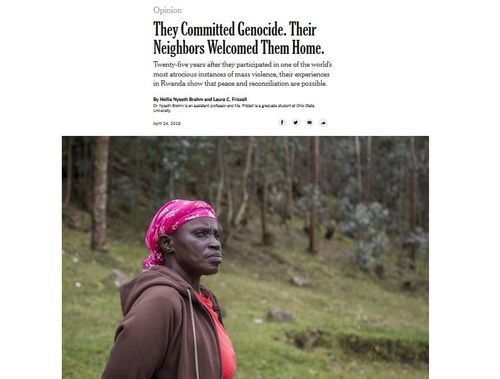


By Steve Sailer
04/25/2019
The New York Times comes up with a new line of attack for letting lots of violent criminals out of American prisons: in Rwanda, everybody’s favorite African dictator Paul Kagame has been letting out many of the countless Hutu perps in the 1994 genocide of Kagame’s Tutsis. (Actually, not many machete murderers were in prisons in the first place: Rwanda mostly put them in camps and had them farm for their food.) So don’t worry about letting out criminals in your country, it’s worked fine in Rwanda:
They Committed Genocide. Their Neighbors Welcomed Them Home.
Twenty-five years after they participated in one of the world’s most atrocious instances of mass violence, their experiences in Rwanda show that peace and reconciliation are possible.
By Hollie Nyseth Brehm and Laura C. Frizzell
Dr. Nyseth Brehm is an assistant professor and Ms. Frizzell is a graduate student at Ohio State University.… What could explain such an unlikely, friendly welcome? Much of the answer lies in where many Rwandans place blame for the genocide. Sources like public school curriculums and government-run memorials paint a complex picture of the violence as rooted in Belgian colonial rule that exacerbated divisions between Hutu and Tutsi.
So, there’s no statute of limitations for blaming the white man, even though the Belgians gave Rwanda its independence 32 years before the 1994 genocide.
These sources also highlight the “bad governments”
I.e., Hutu governments.
that discriminated against Tutsi and encouraged violence during the genocide. By placing blame on historical colonialism and governments, this dominant narrative removes some of the responsibility from the individuals who perpetrated the violence on the ground — especially the uneducated farmers who claim they were acting out of fear or were following orders. ….
There are lessons here for other nations as well, including the United States. The United States has the highest incarceration rate of any industrialized country in the world and despite recent advances, much of the stigma attached to a felony conviction remains. Our prevailing ethos of individualism means that we tend to place all of the blame for an individual’s crime squarely on their shoulders without questioning how powerful people and structures constrain the choices available to the least powerful people. To be clear, we do not suggest that people who commit crimes are blameless, or that the predominant narrative of the genocide in Rwanda is without fault. Instead, we highlight how emphasizing complex causes of violence humanizes perpetrators in meaningful ways.
From my 2003 review of “Hotel Rwanda:”

Unfortunately, the screenplay aims at self-absorbed white liberals who think all Africans look alike and that white racism is the root of all evil. The script even claims that it’s merely a white myth that Tutsis tend to be taller than Hutus, asserting that the Belgian imperialists arbitrarily assigned those identities to random Rwandans. Yet, soon the Hutu Power radio station is broadcasting the prearranged code to begin exterminating the Tutsis: “Cut down the tall trees.”
Rwanda’s true history is more instructive. The medium-height Bantu Hutu farmers arrived 2,000 years ago and drove the pygmoid hunter-gatherer Twa into the forests. Then, about the time of Cortez, the tall, slender Tutsi herdsmen invaded from the north and, according to Gary Brecher, the acerbic “War Nerd” columnist, “claimed all the land, on the legal basis that if you objected they’d kill you.”
The Tutsi rulers treated the Hutu peasantry with the same contempt the Norman lords display toward the Saxon yeomen in Sir Walter Scott’s Ivanhoe. Commenting on Rwanda’s “indigenous racism,” Congo-born sociologist Pierre L. van den Berghe reported that the Tutsis, like other aristocracies, saw themselves as “astute in political intrigue, born to command, refined, courageous, and cruel.”
The Tutsi ascendancy resembled the white pre-eminence in Latin America. Intermarriage was frequent, yet physical differences between the classes endured, just as they have in Mexico, where despite five centuries of intermarrying, the elite remains much taller and fairer than the masses. The trick is that Mexico’s most successful short, dark men often wed tall, blonde women and have more European-looking offspring, thus replenishing the caste system.
Likewise, in “Hotel Rwanda,” Cheadle’s ultra-competent Hutu executive is married to a Tutsi beauty who is taller and fairer than he is. (She’s played by Sophie Okonedo, whose mother is a Jewish Englishwoman.)